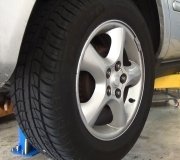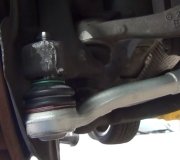Try this: Check all steering components, check sway bar, check steering gear for excessive play.
Also check the track bar for any movement between the ball and socket. Keep in mind that correct ride height is critical for proper handling, braking, and tire wear. All of those things are severely compromised by installing a lift kit. That track bar attaches to the front axle at one end and to the frame at the other end. It holds the axle from moving sideways. That bar is normally perfectly parallel to the ground so the axle barely moves sideways at all as the vehicle goes up and down over bumps in the road. The engineers spent a lot of time designing that system to work at the specified height. By raising the vehicle, that bar is no longer parallel to the ground, and you can expect it to act like you described. As the suspension travels up and down, the axle will move back and forth sideways, but the steering linkage doesn't move so the relationship between them changes. THAT'S what causes it to steer to one side or the other.
If you don't know how to inspect the steering and suspension parts Jacobandnickolas described, have the vehicle inspected at a tire and alignment shop. They won't be happy to align it if needed because they already know tire wear and handling will not be anywhere close to normal. Some of the more reputable shops won't even align anything that isn't at the published manufacturer's height specs.
The front and rear axles are also set to specific drive shaft angles. When those angles are increased or decreased, universal joints wear out faster. With a lift kit, the roller bearings inside the cups travel further during each revolution of the drive shaft so more wear takes place. When people lower their cars, that drive shaft angle is reduced so much that the rollers hardly move at all in the cups. That concentrates the force in one spot and creates indentations over time. As the car goes up and down over bumps and the rollers have to move, they tend to bind and cause a rumbling sound. Raising OR lowering a vehicle often sets up a driveline vibration. That happens on some car models as the springs sag with age, but it can happen to any car that isn't at the correct height. That vibration doesn't affect braking or handling; it's just irritating.
Tuesday, October 11th, 2011 AT 2:10 AM



